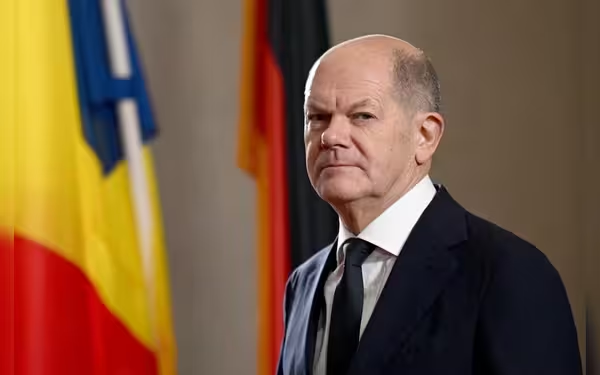Thursday, November 21, 2024 08:39 AM
Scholz's Controversial Call to Putin Ahead of German Elections
- Scholz's call with Putin sparks criticism from Zelenskiy.
- Domestic political pressures influence Scholz's diplomatic approach.
- Increasing interactions between Western leaders and Russia noted.
 Image Credits: thefrontierpost
Image Credits: thefrontierpostChancellor Scholz's call to Putin raises concerns amid upcoming German elections and ongoing Ukraine conflict.
In a significant development in international relations, German Chancellor Olaf Scholz recently engaged in a conversation with Russian President Vladimir Putin. This call, which lasted for an hour, marked their first direct communication in nearly two years. The timing of this dialogue is particularly crucial, as Germany is approaching snap elections in three months, where Scholz faces intense scrutiny from both left and right populist parties advocating for a return to diplomatic discussions.
Scholz's decision to reach out to Putin has drawn considerable criticism, especially from Ukrainian President Volodymyr Zelenskiy, who views the call as a potential breach of Western unity in the face of ongoing aggression in Ukraine. Critics argue that Scholz's motivations may be more about securing political support at home rather than addressing the pressing issues of the war. In response to these criticisms, Scholz stated, "It was important to tell him (Putin) that he cannot count on support from Germany, Europe and many others in the world waning." This statement underscores the Chancellor's intent to maintain a firm stance against Russia's actions.
During the call, Scholz noted that there was little indication of a change in Putin's perspective regarding the conflict in Ukraine. He remarked, "The conversation was very detailed but contributed to a recognition that little has changed in the Russian President’s views of the war – and that’s not good news." This sentiment reflects the ongoing challenges faced by Western leaders in attempting to navigate the complex geopolitical landscape while addressing domestic political pressures.
Interestingly, the call comes at a time when there are signs of increasing interactions between Western leaders and the Kremlin. For instance, U.N. Secretary General Antonio Guterres recently attended a BRICS summit in Russia, and Russian Foreign Minister Sergei Lavrov is expected to participate in a security summit in Malta, an EU member state, in December. These developments suggest a potential shift in diplomatic engagement, even as Russia continues to make incremental gains on the battlefield in eastern Ukraine.
Moreover, the political landscape in the United States is also evolving, with Donald Trump, who has been re-elected to the presidency, expressing confidence in his ability to swiftly end the war. He has appointed cabinet members who are perceived to have a more favorable view of Russia compared to their predecessors. Scholz commented on this dynamic, stating, "In my view it would not be a good idea if there were talks between the American and Russian presidents and the leader of an important European country was not also doing so." This highlights the interconnectedness of global politics and the importance of collaborative dialogue among key leaders.
Chancellor Scholz's recent call with President Putin illustrates the delicate balance of maintaining diplomatic relations while addressing domestic political challenges. As the situation in Ukraine continues to evolve, the actions and decisions of leaders like Scholz will play a pivotal role in shaping the future of international relations. It remains to be seen how these developments will influence the upcoming elections in Germany and the broader geopolitical landscape.













